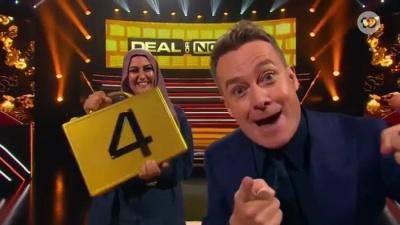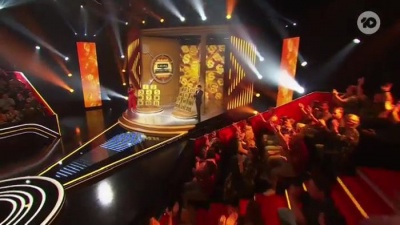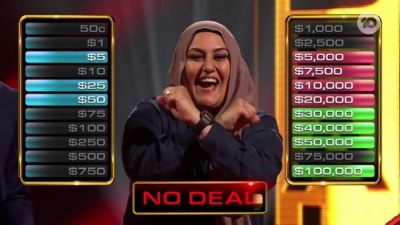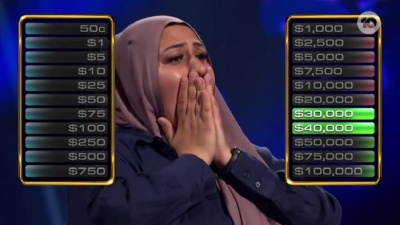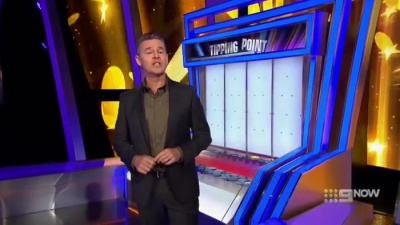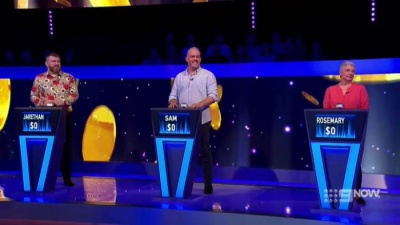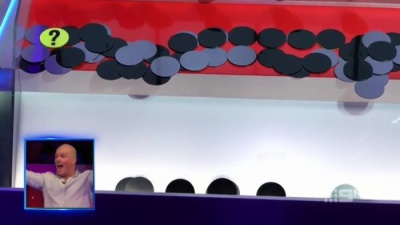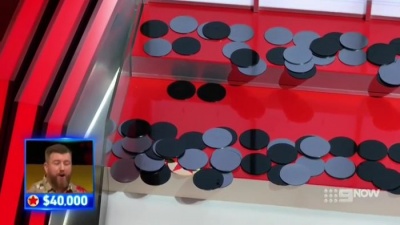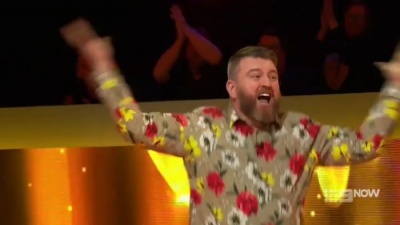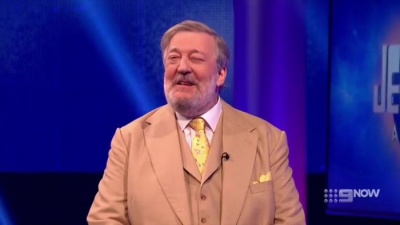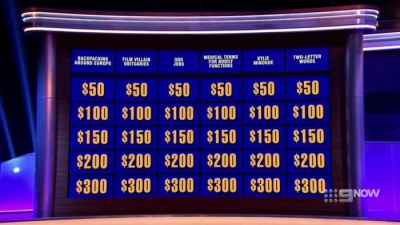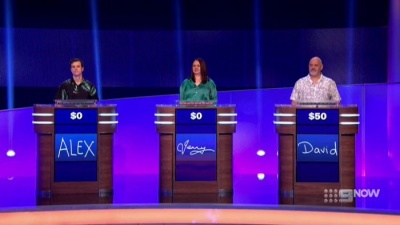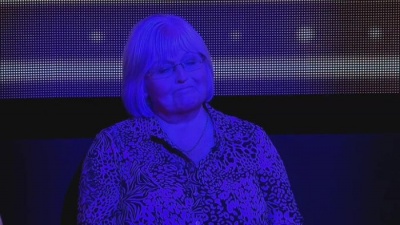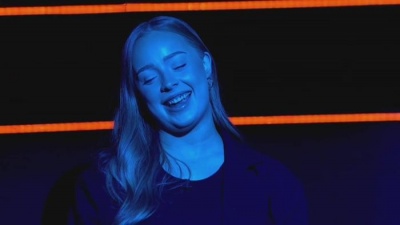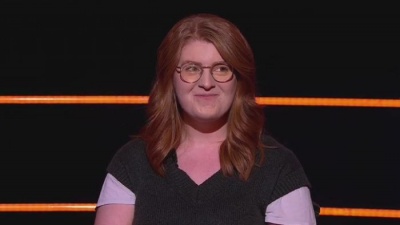Weaver's Week 2024-04-28
Last week | Weaver's Week Index | Next week
We're turning our telly upside down this week, as we look at three hit shows from Australia. All of them are familiar because they've been on ITV at 4pm recently.
Contents |
Deal or No Deal
EndemolShine Australia for Channel 10; our review's from a late March episode
If you cut out all of the fluff, all of the filler, a game of Deal or No Deal can be completed in about five minutes. Open boxes, hear offers straight away, decision points, and eventually choose to deal. Inevitably, the producers want to make their programme last longer than the weather forecast, so there are various extensions.
On this side of the planet, we're accustomed to Deal lasting 45 commercial minutes (about 34 minutes of actual programme), or – later on Channel 4 and in its recent ITV revival – a full commercial hour (about 46 minutes of show). Down under, Deal fits into a 30 minute slot, about 22 minutes once we've chopped out the adverts.
And, let's be frank, this Deal is a bit too quick for our liking. We meet the day's contestant, who is somewhere in the audience of about a hundred pilgrims, and appears not to know that she's playing. Each contestant has brought friends and family to help open the boxes. The player gets a free choice to choose their box when they're on set.
Golden briefcases, rather than red boxes, are the order of the show. Indeed, gold is the predominant colour, as it was on the Indian version we reviewed in 2015 (and which also had friends and family open the boxes. Cases. Stuff it, we'll call them boxes.)
Host Grant Denyer is loud and a bit stereotyped to begin with, he does begin to show a little personality as the programme warms up. He's an appealing character. We've no doubt that – if we watched the show regularly – we'd pick up some of the catchphrases and little myths that every Deal host creates.
The mathematics are similar to our board – twenty-two sealed boxes, ranging from 50 cent to A$100,000 (roughly £52,000, € 60.000, the median household income for about 20 months). Not a dream factory, scarcely a hope foundry, perhaps an aspiration plant. Half the boxes are "blues", no higher than $750. Six are "reds", and the top five (from $30,000 up) are "greens" – it's an easy way to identify the player's power five. The value inside the box is coloured in the same scheme.
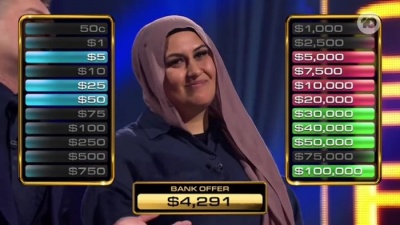 Half way through, and that's an excellent board. But with such a short show, we can't savour the moment.
Half way through, and that's an excellent board. But with such a short show, we can't savour the moment.
As ever, the player will win what's in their box, unless they accept a deal earlier. Six boxes are opened before the first offer, but there's a mini-game as we go along – each box opener tries to guess the amount they're holding – first person to be right wins $250. Five more boxes before the second offer, and this game is going like a rocket.
The Banker doesn't get to speak to anyone, there's no antique telephone in the studio, no witty banter with the host. The contestant never gets a chance to laugh down the phone at The Banker. Instead, he makes offers by flashing up a number: very slick, not at all dramatic. Neither are the offers: around $1500 first time, $4000 second, $5000 at the eight-box deal.
Three commercial breaks in the half-hour programme – one after the contestant chooses their case but before opening anything, another after rejecting the second offer (done by making a cross with the arms, in the style of Dermot on Big Brother's Little Brother), another around the six-box offer which is the first one worth seriously considering. Should the player continue, they'll get offers with four and three boxes in play, and the two-box dilemma.
We got lucky in our random choice of episode: the contestant ended up with $30,000 and $40,000, and we can't fault her for going all the way ("All! The! Way!", a catchphrase echoed through the lively studio audience). Viewers have tended to agree, Deal or No Deal gets decent ratings, skews well amongst the young viewers loved by advertisers.
This is Deal or No Deal stripped down to its basics, the bare essentials of the game. We just about have enough to get into the game, to cheer for the contestant and share in her dreams; we certainly have enough to spot Grant Denyer as a lively and vibrant host. It's perhaps a little fast for this column's tastes – we reckon 22-box Deal would be best in a 28-minute slot – but this is a serviceable programme that never outstays its welcome.
Tipping Point Australia
EndemolShine Australia for Channel 9; our review's from a "sneak peek" episode shown last December
A "sneak peak"? December and January is high summer in Australia, most of the country takes the whole of January off, and a lot of television and radio hands the schedules to filler. Tipping Point was going into a high-profile slot after the early evening news, and Channel 9 wanted to build excitement so aired one of the best episodes during the holiday break.
The set is familiar, as it should be: Tipping Point is filmed in Bristol, they didn't re-create The Machine in a studio down under. Three contestants take part, like on recent ITV episodes. They play before a live audience, so perhaps the closer analogy is to the Lucky Stars series with celebrities.
Todd Woodbridge is the host, and it's hardly a surprise to learn that he's gruffer and harsher than Ben Shephard. Let's be honest, a piece of supersoft toilet paper that's been nibbled by a cute puppy is harder than Ben Shephard. Todd picks up much of the show's lingo – "ambient drops" play a big role in this show, and he references "ghost drops" as though we'll know what they mean.
We're surprised to learn that the rounds on Tipping Point have names. "Bank Builder" starts the show – three counters each, play or nominate. Incorrect answers still cost a coin, but this counter is completely lost from the game – there is no penalty pot, which will reduce the prize they'll give away.
"Quick fire" is round two, with 30 seconds on the clock for each player. Then comes the "Head to head", and the final (which doesn't have a specific name). The show runs for an hour, and there are ad breaks after every round, plus ones halfway through the head-to-head, and halfway through the final.
Each counter over the tipping point is worth $100, almost exactly the same as our £50. Mystery prizes are part of the game on Channel 9, and they're described in great detail, including the manufacturer's recommended retail price. You wouldn't catch Ben saying "You've won a dinner cruise for two on the Thames from Grub-u-float, a prize worth £95."
The big change comes at the end. Just five categories in the final, but the target is still to get the same jackpot counter down the same machine. Five questions rather than six makes the challenge so much harder – like the loss of the penalty pot, it reduces the amount available for losing players. Succeed in the jackpot endeavour, and our contender will win the show's prize of $20,000 (near enough to our £10,000).
Fail in the final, and it's not over. Todd will offer the "Jackpot Temptation" – a different prize to get the jackpot counter over. In this preview edition, the jackpot was on the edge of the tipping point, pinned in place by a counter above it. It wasn't going to fall of its own accord, but a good shove in the right place was certain to knock it over.
This information fed into the Jackpot Temptation. The contender can spend their money on three extra counters, which would net $20,000. Or he can spend their money on two extra counters, for $20,000 and a holiday in the Maldives (valued at $11,000). Or just one extra counter, for $40,000. Remember, the stake is a few hundred quid less than ITV viewers might expect; the producers want to offer this temptation most days, and have it taken a bit more than otherwise.
The offers change from day to day, between contestants and their situations. Some days, the jackpot needs more work, and the offer could be three counters for $40,000. Cars and holidays are often involved, anything to get a sponsor's plug in. Other players have been able to negotiate with Todd, and today it sounded as though he was just about to offer something more enticing when our contender made up his mind.
We said that this was a teaser episode, and here's why it was a teaser episode. The contender took the one-counter offer, got the jackpot over, and won $40,000.
Jackpot Temptation is a very different idea to Ben's usual gamble. The stakes are higher – give up a sure $4000 for a shot at $40,000? It makes the end game somewhat more difficult, more unpredictable. Probably increases the prize overall, which suggests we won't see it on ITV anytime soon. It works for the Aussie market, Tipping Point Australia is regularly in the nightly top ten.
Jeopardy! Australia
Whisper North for Channel 9, from 20 April
"From the Dock Ten studios at Media City." Guys, guys, guys. You can say this in as many accents as you want, it's still the least interesting sentence on television. We'd even prefer, "Staying with the live croquet here on BBC4, and Top of the Pops will now be shown at three in the morning." Anyway. Stephen Fry is the host, and he's here in a lovely gold suit.
We reviewed Jeopardy! on ITV barely three months ago – see the Week of 21 January – and this is a direct carbon copy of ITV's show, which is pretty darned close to the North American original. So we're going to look at the very few differences.
The cash amounts for each question are a little different: $50 to $200 then $300, which is about 4% more than the sterling equivalent because of exchange rates. Doubled for Double Jeopardy!, of course. They're still giving away about £5000 per episode, but it's presented as $10,000.
Here's one change: the show is fractionally shorter. And we do mean fractionally. ITV's show runs about 46 minutes, Channel 9's just under 45 minutes. Trim a couple of Stephen Fry's anecdotes and we're there.
Aussie telly has more ad breaks than we get. In this show, they're at the end of round one, halfway through round two, at the end of round two, halfway through round three of Double Jeopardy!, and while the contestants are pondering their Final Jeopardy! bets. Contestant chat comes after the first break, between rounds one and two; and a chat based on what we've seen between two and three. The voiceover at the start and the end is by Grant Stevens, a friendly Aussie voice.
Are the questions particularly Australian? Not in this first episode: a round on Kylie Minogue's career was international, and could easily have gone to contestants here. A round on the Ashes (cricket version) was mostly about Australian winners, which reflects the balance of power in the sport. "They used to be Neighbours" is about people who used to be in the BBC/Channel 5 soap, filmed in Melbourne and probably shown over there. We saw at least one unfamiliar name credited as a question writer, so there was probably some local input.
The contestants are smart, there aren't too many triple stumpers. This episode's players did have a little more difficulty phrasing their responses in the form of a question, and Stephen's warning before Double Jeopardy! carried more threat than on ITV. Winner gets to take their cash prize, losers have nothing more than a trip to sunny* Manchester. And the credits – full credits – are in the ITV house style.
Viewers to Channel 9 reacted with a resounding "where's the remote?" and didn't watch last Saturday's premiere edition. To any sane and sensible network, one night's rating doesn't make a summer, but with Jeopardy! Australia only airing weekly, we have a nasty feeling that it might be held back to, er, give the other shows an opportunity.
In other news
The 1% Club had lots of drama last weekend.
Anyone think they won't win?
"I don't think I'll do well, my mind thinks strangely."
First question: one out.
"You have got to be kidding me!"
Later, we hear from Natalie, who is an extremely competitive person. How does that manifest? "I've got one older sister who is known as the smart one, so after today she won't be any more. She's right over there, I'm gonna beat her! It's the only thing that matters!"
Next question. "Oh dear! We have lost Natalie, competitive sister! Let me have a look to my left... yes, light is on. What happened there?" The double whammy of not knowing it and her light's still on. Apparently, there's a forfeit: wearing t-shirts "The Clever One and The Other One."
By the time we hit 30%... "There's only two people who still have their passes. And one of them – this is really gonna irritate! – is Charlotte. Winner of the sister competition already."
And once we've got through the 10% question... "There's one person left with their pass. Charlotte. Not only are you the smuggest sister, you can pay your way to the 1% question. Natalie, let's check in. The light is blue, you've gone green!" "Yeah, I was bitter, but now I'm not competitive against her any more, I'm kinda competitive on behalf of her. Now I want everyone else to lose and she's gonna win!"
In the event, Charlotte did pay to the final, and chose to take the £3333 smaller prize – nobody would have got the 1% question.
That, folks, is character development as a subplot to the quiz. Natalie has grown as a character, and it's been brought out to viewers at home. We didn't turn on The 1% Club for a Brechtish drama, we didn't expect to see improvised Shakespeare, but we'll take it.
Oh, Stephen [sad_face] Some "interesting" decisions in the new series of Stephen Mulhern's In for a Penny. For the first time, they've dropped the conceit that all games are filmed in the same destination. Sure, one petrol station forecourt looks like any other petrol station forecourt, and supermarket car parks are a little interchangeable, but there's less room for funny business with the local celebrities.
We also hear that they're offering a trip to Florida for viewers. Really? It's true that Disneyland is the place where dreams are made, a little duchy of magic and marvel. But it's in Florida, a place that simply isn't safe for trans people to be themselves, and may not be safe for Black people. Local rights groups – the Human Rights Campaign, the National Association for the Advancement of Colored People, the League of United Latin American Citizens, and others – have warned that anyone who isn't a straight white man is subject to "openly hostile local laws".
This legal discrimination might not apply to Stephen Mulhern (we learned this week that he's dating Josie Gibson from Big Brother and This Morning; good wishes to them), but bans on using the toilet and concerns about other people carrying guns will concern a lot of viewers. We're deeply uncomfortable about anything that would put viewers in danger, however indirectly, and we rather hoped ITV would share this caution.
More shouting at the telly A new run of In With a Shout, and Joel Dommett's show had a few rules tweaks. Different money ladders, more evenly spread from £0 to the target – last year's jump from nothing to £1500 is not repeated. They've replaced the halve-double-quadruple round with a new tug of pictures, on the grounds that Alex Scott's The Tournament has been left in the mud. With £10,000 at stake in this round, and somewhat less available in the earlier rounds, the entire show can and often will spin on the final minute, which doesn't feel quite right.
The final round remains difficult to lose, though a maximum of five passes before a correct answer means we could end with a lot of guessing – reminiscent of Five Minutes to a Fortune, which really deserves to be brought back.
Tempting Fortune is back for another series. The show, hosted by Paddy McGuinness, features a lot of people on a walking tour where they're offered commonplace treats at sky-high prices. Channel 4 have commissioned even more of this stuff, claiming that it was "one of their most successful entertainment launches of 2023" and "young people watched this on catchup".
Last year's series chose to concentrate on the bickering and arguments, something this column found infuriating. This year's looks to fall into the same errors, the press release falsely claims that "the real test is not survival, it's avoiding the temptations thrown at them." Nonsense: the real test is having the courage to make the right choice for yourself, mediated by peer pressure from the group as a whole. The puritans who are out to ruin your once-in-a-lifetime journey, they can go talk into their hands. Money is not necessarily more important than living a full life. Eight episodes of this Calvanist propaganda later in the year.
Chess Masters comes to BBC2, players battle over a sequence of rapid-fire chess games over eight episodes with one emerging as the winner. Curve Media is making the show, we're looking for an episode of 1980s show The Master Game to compare.
It's back! Last year's most heartwarming programme The Piano returns (C4, Sun); there's a documentary about last year's winner Lucy next week. Scotland's Home of the Year returns (BBC1 Scotland, Mon). Interior Design Masters reaches its conclusion (BBC1, Tue). What could be an interesting documentary on Miriam Rivera from There's Something About Miriam (C4, Mon-Wed). Pop stars including Sinitta and H From Steps on Bridge of Lies next Saturday, Iwan Thomas and Lucy Spraggan on Pointless Celebrities (both BBC1), and The 1% Club probably channels Steinbeck.
We don't intend to publish next week, so watch out for I Kissed a Girl (BBC3, from Sun 5 May). Celebrity Beat the Chasers is stripped across ITV (Mon-Thu, from 6 May). A new run of The Finish Line with Roman and Sarah (BBC1, from Mon 6). Eurovision Song Contest semi-finals (RTÉ1 and BBC1, Tue 7 May; RTÉ2 and BBC1, Thu 9 May); more on these shows when we next meet. Double the Money (C4, from Thu 9) asks pairs of players to build their own prize.
Picture credits: EndemolShine Australia, Whisper North, Silver Star / Magnum Media.
To have Weaver's Week emailed to you on publication day, receive our exclusive TV roundup of the game shows in the week ahead, and chat to other ukgameshows.com readers, sign up to our Google Group.


